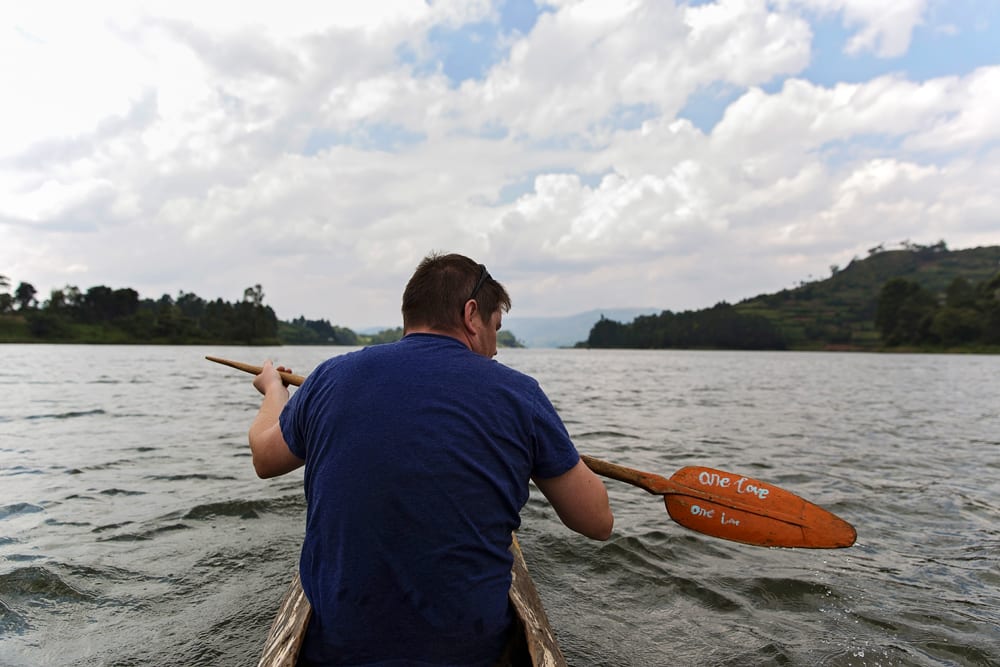 Dec 15-20
Dec 15-20
Our ride back from Queen Elizabeth passed uneventfully enough… until we were about 50kms from Kabale. Rich realised that the needle on the fuel gauge had dropped rather dramatically and we were now in rather desperate need of diesel. Normally, this wouldn’t have been an issue, since gas stations had been more common than a Cockney in Bermondsey. Unfortunately for us, in a plot twist deserving of an especially bad comedy, we’d reached a particularly uninhabited and mountainous stretch of road and there wasn’t a gas station in sight. Rich was convinced he could make it if he put the van in neutral and coasted down the hills, so we sat in increasing silence (with the exception of several moments when Alex lost faith in Rich’s driving skills around a few mad bends and yodelled like a grandmother who’s dropped an ice cube down her upholstery-patterned blouse) as we discovered that the roads went mostly uphill. Whoops. Each road we spied around the next bend seemed to only move higher than the one we were on, until finally we started to move downhill and the coasting started.
Running practically on fumes, we made it back to Kabale and Rich let out a contented sigh, knowing he’d escaped a major bit of trouble with his wife. After a quiet evening, we parted ways with Alex and the following morning we made our way to Lake Bunyonyi, where we spent four days doing as little as possible.
We arrived at the dock and spied a line of dugout canoes, one of which we’d use to get to the island. Rich asked if I was concerned about my camera gear; I replied, “No. If we went in THAT one (pointing to an exceptionally narrow boat), I’d be concerned, but I’m sure we’ll be fine.” I’m sure it’s no surprise which one we ended up being assigned… The boat was so small that it became immediately apparent that it wasn’t designed for mzungu hips. I lowered my bags into the boat and squeezed my hips through the none-too-wide opening and then giggled like a fiend as Rich struggled to follow suit. To add to my good humour, I learned shortly thereafter that our boat “captain” was named…. Noah. The irony of Noah and his little boat left me in stitches for the rest of the day.
Itambira Island is reached via a 50-minute paddle using quite possible the least efficient paddle design I’ve ever seen. Well, not quite. A plain stick would’ve been less efficient, but only marginally. For those who know Rich, you can imagine that this design flaw would’ve been a source for great analysis, except that he was facing bigger problems – the beer and gin from the evening before, combined with the unsteadiness of the boat, were making for one unhappy Welshman. While I settled into a rhythm after the first ten minutes of paddling, Rich descended further and further into his water-induced misery and was ecstatic to see the dock come into view.
“Lakesickness” aside, Byoona Amagara Island Retreat was immediately appealing. After a week on the road and the simple accommodation provided at Mweya Hostel, we were ready for something a little different, and that was exactly what we got. Most of the accommodation provided was in geodomes that didn’t look like domes at first glance, but were easily recognisable as such when viewed from the inside. Reed thatch and sticks were fitted over poles assembled in the telltale triangular pattern, and space was left for a triangular patch of plastic sheeting “sunroof.” The inside was fitted with a decent-sized bed, mosquito net, and a few chairs and tables of different heights, and the entire front portion of the dome opened onto the deck, which was impressively private. An impressive variety of birds chirped from trees and bushes around the deck. We were both instantly charmed.
While at Lake Bunyonyi, we read copiously, enjoyed each morning’s burst of sunshine before watching the afternoon thunderstorm roll in, and tried as many dishes as possible on the simple pescatarian menu (crayfish feasts being a specialty). The evening thunderstorms came, almost without exception, during dinner and lasted well into the night, treating us to a rather impressive lightning show out the front of our geodome. Four days passed quietly in a haze of sunshine, thunder, cards, food, and tea, none of which hurt our feelings. :)
I overheated while sunbathing on the first day, so thought I’d pop down to take a quick cold shower – and learned just how ‘cold’ their cold showers actually were: cold enough to take my breath away… After making the best fifty cent spend since starting the trip, I later had a wonderfully hot shower, hand-delivered by a couple of girls from the kitchen. There were a few details other than the cold water that took a small amount of adjusting to during our stay: the lack of electricity (evening chats and games of gin by candlelight were a refreshing change); the solemnity of Diana, our waitress; the fact that the groups of guests at the hostel didn’t really seem to interact with each other; and the lack of comfortable seating/sleeping options. One detail that took A LOT of adjusting to was the presence of spiders. I’m a mild arachnophobe; I don’t generally like spiders, but when I’m in their space, I’m willing to leave them to it. This island, however, was a bit of a compromise and we all had to share space. Over the first three days, I got used to the fact that our roof constantly ticked with presence of various insects; I got used to the fact that there was always eight-legged company in the composting toilet when I visited it after dark; I got used to generally trying not to shine my headlamp at any walls once the sun had gone down; and I thought I’d gotten used to the presence of rather large, bulbously thick-bodied spiders in my bedroom – until, lying in bed one morning, I saw one scrambling over our untucked mosquito net. At this point, I let out a howl best compared to the sound a deaf choir would make while singing in a steam room. And then I promptly, and with a complete lack of grace and composure, made my exit from the bed. Guess I’m not over my fear of spiders just yet.
The time came to leave Itambira Island and we did so with laughter in the air. As our motorboat sped out across the lake, we took in the sights: a woman crouched over the edge of the dock, collecting water for the lake’s primary school; a low-riding canoe, filled with jerry cans making its delivery rounds; two huge, graceful cranes, sweeping across the surface of the lake. And then it was done. We arrived back at the dock, hopped in a taxi, and headed for Katuna, where we crossed back into Rwanda. A bus back to Kigali, a quick stop at Meze Fresh for tacos again (we couldn’t resist), and then another moto ride back to the airport so that we could catch our flight to Johannesburg, and our time in East Africa was officially over.
Grateful for: candlelight; thunder

